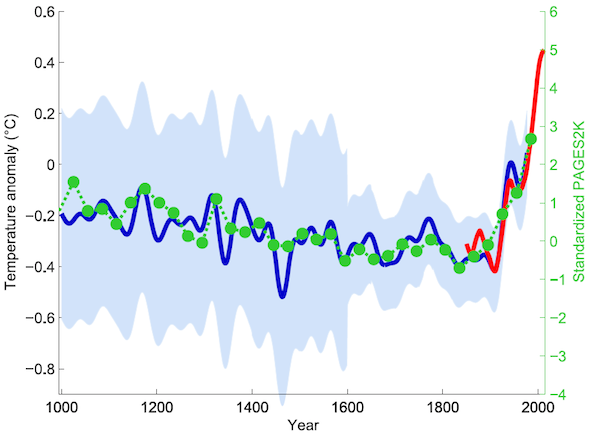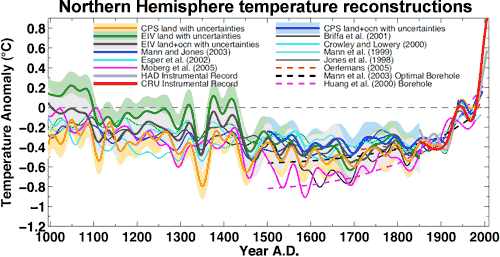Two years ago, a Competitive Enterprise Institute (CEI) analyst said something incredibly nasty about Penn State University climate researcher Michael Mann:
“Mann could be said to be the Jerry Sandusky of climate science, except that instead of molesting children, he has molested and tortured data in the service of politicized science.”
Mark Steyn at the National Review passed on those comments in a blog post and added that Dr. Mann is “behind the fraudulent climate-change ‘hockey-stick’ graph…”
Dr. Mann subsequently sued both institutions and court filings have been flying back and forth ever since. Dr. Mann’s lawyers have just filed a response to scientific and legal claims from the National Review and CEI. As their new brief makes clear, any claim that Dr. Mann’s research is “fraudulent” is pure bunk.
The Serengeti strategy at work
In his book chronicling the attacks he’s faced, Dr. Mann compares climate contrarians’ strategy to the one used by predator animals he saw in Serengeti National Park in Tanzania. Rather than trying to take on all the world’s climate scientists, they pick out someone from the herd who they think they can attack effectively. He’s faced many over-the-top criticisms of his research—and his character—from the Wall Street Journal editorial board, Rep. Joe Barton (R-Texas) and a whole host of front groups, political actors and online haters.
Why all the fuss? In the late 1990s, Dr. Mann and his colleagues found that much of world is warmer than it used to be. The key graph from their research looks like an upturned hockeystick, a nickname that stuck. At the time, it was groundbreaking work. It also blew a hole in a standard contrarian talking point: that it used to be warmer in the Middle Ages.
Fifteen years after Dr. Mann and colleagues published their initial research, climate contrarians are still attacking it as if it’s the keystone that holds up the entire edifice of climate science.
Climate science goes to court
The National Review’s last filing in this case devotes a section to rehashing whether or not research Dr. Mann’s original research is valid. They largely cite contrarian books, statements from Sen. James Inhofe (R-Oklahoma), an article from the Telegraph newspaper and Congressional testimony from a contrarian climate scientist. Nothing in their brief substantiates an accusation of “fraud.”
CEI has done the same in some of its filings, though it takes a more sophisticated approach. CEI does more to dress up its accusations in the language of science, but their brief emphasizes typical scientific uncertainties and nitpicking while downplaying the fundamental soundness of the original hockeystick. Again, there’s no evidence of “fraud” in their brief.
What’s missing, of course, from all their briefs, are legitimate scientific citations rejecting or refuting Dr. Mann’s work. That’s because those don’t exist.
As Dr. Mann’s response brief notes, follow-up studies have “not only replicated Dr. Mann’s work using the same data and methods, but independently validated and extended his conclusions using other techniques, and using newer and more extensive datasets.”
Indeed, climate scientists have more hockeysticks than an NHL locker room:

A 2013 study took a comprehensive look at so-called “paleoclimate reconstructions.” The result “looks like a twin” of the original hockeystick, according to researcher Stefan Rahmstorf. Graphic via ThinkProgress.
It’s fair to say that Dr. Mann’s original research is among the most scrutinized scientific papers of all time. If it were fraudulent – or even just wrong – we’d know by now.
Scientists take fraud and retractions very seriously. Look at the Andrew Wakefield case: The Lancet retracted his research on vaccines and autism and he was banned from practicing medicine. Or skim the great work over at Retraction Watch.
CEI and the National Review also pass on lame rehashings of emails that were stolen from climate scientists back in 2009. National Review’s brief largely ignores the investigations that cleared Dr. Mann and other scientists of the accusations climate contrarians lobbed at them. CEI’s brief cites these investigations, including one from the National Science Foundation (NSF), but tries to downplay them and question their credibility.
As Dr. Mann’s response brief notes, two universities and six government agencies examined the claims climate contrarians were making about the emails and rejected them. His brief cites the NSF’s conclusion that, “…no direct evidence has been presented that indicates [Dr. Mann] fabricated the raw data he used for his research or falsified the results.”
Again, no fraud.
Never the less, National Review’s Steyn has tripled-down on his initial accusations. In a recent post on the case, he called Mann “Doctor Fraudpants.” I suppose in some circles, that’s hilarious. But the humor of accusing a scientist of living a lie is lost on me.
Different worlds
I attended a hearing related to this case last June. It was disturbing to listen to lawyers for CEI and the National Review accuse Dr. Mann of conducting fraudulent research while he was sitting right there. I squirmed in my seat more than once and quietly shook my head at their presentations. It was clear that the lawyers didn’t understand the scientific research they were discussing. I felt like I had stepped way, way down a rabbit hole.
After the hearing concluded, one of the lawyers for the defendants walked up to Dr. Mann outside the court room and asked to shake his hand. He was aghast when Dr. Mann politely declined – as if the lawyer was the one who just had his honor and integrity insulted.
From the lawyers’ perspective, perhaps this was just another day at the office. But for Dr. Mann it was an affront to his character, ethics and work as a scientist.
Crossing the line with attacks on science
I’m not a libel lawyer or a First Amendment scholar. Unlike Dr. Mann’s detractors, I’m not so convinced of my own righteousness that I claim to have expertise on topics that are well outside my wheelhouse. I’m just a guy who loves science and appreciates everything scientists do to inform us about our world.
It’s worth noting that other judges have previously sided with Dr. Mann. Litigants in those cases, including Virginia Attorney General Ken Cuccinelli, also did not have a leg to stand on when it came to accusing Dr. Mann of fraud.
Generally, courts and judges have shown respect for the weight of the evidence on a range of scientific issues, including climate, tobacco and asbestos. In this case, it’s abundantly clear to me that the attacks on Dr. Mann are the result of ideological thinking run amok, not any real dispute about the science. Steyn, National Review and CEI can argue against government policies all they want, but misrepresenting scientific research to make their case simply degrades public discourse.
Finally, comparing a scientist to a child molester and accusing him of fraud is ethically indefensible. Whether or not it is legally defensible remains to be seen, of course, but I’ll be watching this case closely.

